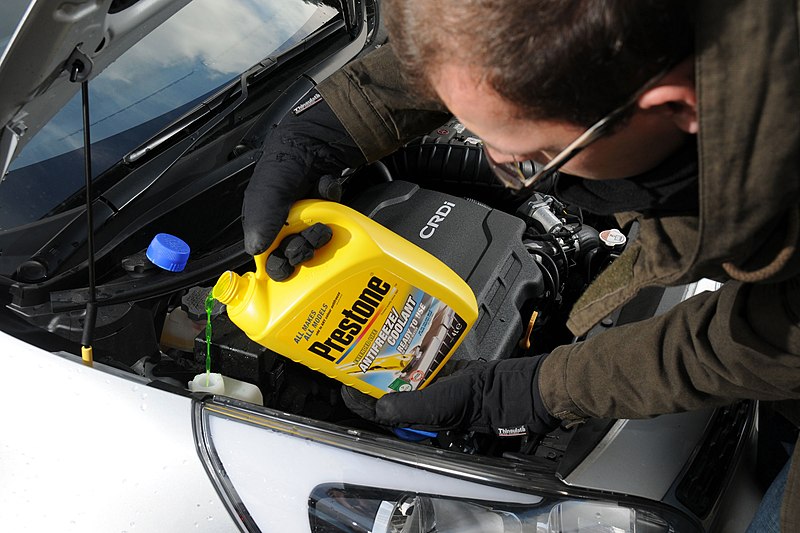How Much Does It Cost To Fix A Coolant Leak?

Photo by Gasper12345 from Wikimedia Commons
A critical part of your car is the coolant, helping to prevent your motor from overheating. Often, we may not know that there is a leak, only noticing it when it’s too late. Your car should have a sensor, but if you don’t maintain it, you could check for other signs that you need to fill up or talk to a professional.
When dealing with coolant leaks, the common question is, “how much does it cost to fix a coolant leak?” To walk you through the process and answer your concerns, we’ve got a breakdown of coolant leaks along with a look at the average cost you can expect to pay.
What is A Coolant Leak?
Coolant, or antifreeze, leaks are often caused by faults in your radiator. Most of the time, a coolant leak starts when there are holes or debris within radiator tubes. As your car ages and mechanical parts wear down, they eventually need to be replaced.
You may notice a coolant leak in several different ways, and it is something that you should try and take care of right away. These minor mishaps can create holes in the radiator, which leads to the car leaking. So, how much does it cost to fix a coolant leak? Let’s find out.
GET THE SAME INSIDER INFO THAT DEALERSHIPS USE
The CoPilot app is the smartest way to buy a car. Built using the same technology that dealerships use, we’ll show you everything you want to know about each listing - like how long it’s been on the lot, or if there are similar vehicles at a better price nearby.
How Much Does It Cost to Fix a Coolant Leak?
There are a lot of factors that can affect the total cost of repairing a coolant leak. There is no one answer to how much it costs to fix a coolant leak, depending on your situation. The average cost to repair a coolant leak is $786.00. Common factors that factor into the total price include:
The Timing
When dealing with a coolant leak, the sooner, the better. If you catch it early, you may only be out $100. However, if it goes on for a while, you may not be able to have everything solved without spending an arm and a leg. The increase in cost directly affects the other damages that coolant leaks can cause. Many parts, including the engine and others, could be at risk if the leak is not addressed in time.
The Damage
The main factor that drives up cost is a leak’s damage to your vehicle. It may burn through your radiator or cause damage to other systems within your car.
Your Area
You also need to check for average prices in your area, as some cities, states, and towns may be more expensive than others. Check within your location to see the exact average and get a better idea of what it will cost you where you are.
THE BEST USED MINIVANS ON THE MARKET
When it comes to hauling a lot of people and cargo, the minivan is hard to beat. We’ve factored in reliability, affordability, and functionality to create this curated list of the 8 best used minivans on the market today.
How to Know Your Car is Leaking?
Before rushing to get your car looked at, you may determine whether your radiator is leaking by looking for a few signs. When you suspect a coolant leak, keep an eye open for these four things below.
1. Engine Overheat
The purpose of coolant is to keep your engine cool and running smoothly. It will alert you when it runs out by letting off a strong smell or producing smoke.
2. Visible Leaks
One of the most common signs is a small puddle of fluid under your car. If you see puddles, you probably have a coolant leak. If it dries, it winds up looking like a dark stain, often staying on a driveway for years.
3. The Smell
Coolant has a sort of sweet smell. It might sound weird, but give it a whiff next time you purchase a bottle. If your car starts to leak, it will let off the smell of coolant, acting as a sure sign that you should take a look and see what’s causing the issues.
4. A Clear Warning
If your car’s electrical system is working correctly, you’ll get a clear warning that something is going on. When the engine heats up, the warning sign will come on, acting as a clear indicator of an issue with your car that needs attention.
Is My Car Drivable with Leaking Coolant?
One of the most significant issues that drivers face when they have a coolant leak is that there seems to be no severe damage at first. However, if left and unfixed, the car and many of its parts could suffer irrefutable damages. It’s always a good idea to fix a coolant leak as soon as it’s noticed, avoiding damage that could add up in the long run.
THE BEST USED SUVS UNDER $10,000
We looked into price, reliability, features, and more to create this list of the best used SUVs under $10k on the market today. Take a look - some of the best used SUVs have gone mostly overlooked or forgotten.
Are Coolant Leaks Common?
They are widespread. Coolant leaks can affect any make, model, or year of car. Drivers who suffer from recurring coolant leaks should assess their driving style, ensuring they are not overworking their engine for long periods.
The key to keeping your car running like a well-oiled machine is keeping it in its best possible shape. To do that, make appointments with professionals often and ensure that you get it checked out fast if something looks wrong. In addition, it’s also important to keep vehicles serviced and schedule maintenance when necessary.
Quick Tips to Maintain Your Car Radiator (And Prevent Coolant Leaks)
Your car’s radiator is an important device that circulates coolant around the engine. Taking good care of the radiator decreases the chance of coolant leaking into your engine. Here are some quick tips you should know:
- Perform regular checks - It’s always best to catch the problem before it gets worse. Periodically checking your radiator allows you to maintain correct coolant levels.
- Use the suitable coolant - There’s no such thing as one-type-fits-all when it comes to coolants. Always use coolants that are specific to your make and model.
- Flush your radiator regularly - Every 12 months or 30,000 miles, whichever comes first, you should flush the radiator and replace the engine coolant. This helps remove rust buildup and residue and keeps the radiator up and running.
- Do fluid checks - As mentioned, maintaining correct coolant levels is crucial. This can help prevent overheating during hot weather, and this will stop the fluids from freezing during colder climates. Proper fluid maintenance can go a long way in avoiding coolant leaks.
- Don’t overload your car - The heavier the load your vehicle carries, the more stress is placed on your car radiator – this may cause the engine to overheat.
The Earlier, the Better
Once you know how much it costs to fix a coolant leak and the factors that increase that cost, you realize the reasons why you should keep a close watch on your car. Instead of letting things creep up, catch them early and save a bit of money in the long run.
Like many other issues with your car, early detection is vital. The longer you let things drag out, the more potential damages you can do. So, if you catch the signs and symptoms of a coolant leak, start taking steps to get it fixed before it’s too late. You’ll wind up happy you did and save a few bucks in the end.
Frequently Asked Questions About Coolant Leaks
Q: What causes a coolant leak?
A: A coolant leak can be caused by a variety of issues, including a blown head gasket, damaged radiator hose, faulty water pumps, or a cracked coolant reservoir.
Q: How much does it cost to fix a blown head gasket?
A: Repairing a blown head gasket can be expensive, with costs ranging from $1,000 to $3,000 or more, depending on the vehicle and labor costs.
Q: Can a damaged radiator cap cause a coolant leak?
A: Yes, a faulty radiator cap can lead to a coolant leak. Replacing a radiator cap is a relatively inexpensive fix, typically costing less than $10 to $34.
Q: What is the cost of repairing a heater core leak?
A: Fixing a heater core leak can be costly, with prices ranging from $800 to $1,000 or more, depending on the vehicle type and labor costs.
Q: Should I fix a coolant leak immediately?
A: Yes, it’s essential to address a coolant leak promptly to prevent engine damage and avoid more costly repairs in the future.
Q: How can I identify a coolant leak?
A: Signs of a coolant leak include a sweet, syrupy smell, visible coolant puddles under the vehicle, a constantly low coolant level, or engine overheating.
Q: Can I drive my car with a coolant leak?
A: It’s not recommended to drive a vehicle with a coolant leak, as it can lead to engine overheating and severe damage. It’s best to have the leak repaired as soon as possible.
Q: How often should I check my coolant level?
A: It’s a good practice to check your coolant level at least once a month or as recommended by your vehicle’s manufacturer. Always check the level when the engine is cold.
Q: What is the difference between a coolant leak and an oil leak?
A: Coolant is typically green, yellow, or pink and has a sweet smell, while oil is usually brown or black and has a more pungent odor. Coolant leaks often form puddles under the front of the vehicle, while oil leaks tend to accumulate near the engine or the rear of the car.
Get a Curated List of the Best Used Cars Near You
The CoPilot car shopping app is the easiest way to buy a car. Tell us what you’re looking for and we’ll search the inventories of every dealership in your area to make you a personalized list of the best car listings in your area.
Only looking for newer models? CoPilot Compare is the search engine for nearly-new cars. Only see cars five years or newer with low mileage — CoPilot Compare is the best way to find off-lease, early trade-in, and CPO cars.
The best part? CoPilot is built using the same technology that dealerships use to buy and sell their inventories, so we have more info on each vehicle than competitors. CoPilot doesn’t work with dealerships, so there are no sponsored posts or other shady practices — just the most info on the best cars. Check out our About Us page to see how CoPilot works.








